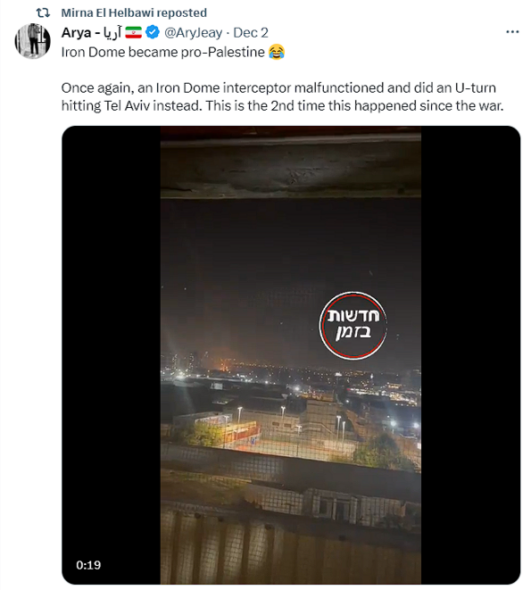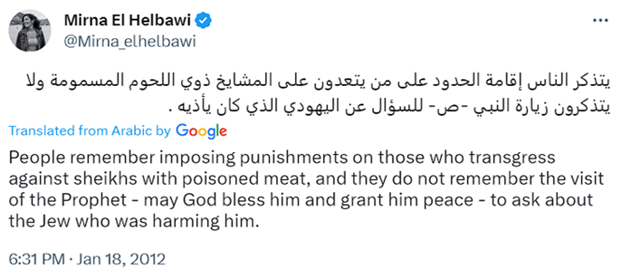“It’s about humanity.” That’s how a CNN article describes one woman’s efforts to help connect Gazans to telephone and internet services. “We are the voice of all these victims,” says another journalist extensively quoted in the piece who benefited from the effort. The problem? Their concept of “humanity” doesn’t include Israelis, and when Israelis are the victims, their voices express glee.
By telling only one side of their public rhetoric in the CNN article “When Gaza lost phone and internet connection under Israeli attack, this activist found a way to get Palestinians back online,” authors Alaa Elassar and Emma Tucker wildly distort the reality of the conflict and the attitudes of the respective parties.
The woman at the center of the initiative is Mirna El Helbawi, described as an Egyptian writer and activist. She founded “Connecting Gaza,” an initiative that uses virtual SIM cards to help Gazans skirt the intermittent telecommunication blackouts occurring during the war between Israel and Hamas. Part of the importance of the initiative is explained by El Helbawi as being because “journalists can’t document atrocities on the ground, including possible war crimes…” She has been “anxiously watching the war unfold since October 7,” and is upset that Gazans “can’t even share their grief with the world or scream for people to demand a ceasefire.”
But is El Helbawi truly a humanitarian?
Consider some of her reactions since the October 7 massacre carried out by Palestinian terrorists:
- On October 11, she wrote, “It’s amazing how my story views got cut into less than half because I am defending Palestine and its fighters,” going on to declare, “Long live whoever standing against the oppression.”
- On October 12, she declared, “The oppressed have a right to resist.”
- On October 16, she posted about Netanyahu’s denial of a truce in Gaza to allow for the entry of aid and the exit of foreigners, declaring that the latter was “a real job for Jews [laughing emoji].”
- On November 8, her Instagram featured a video of the terrorist Ghassan Kanafani, who was a member of the internationally designated terrorist organization Popular Front for the Liberation of Palestine. In the video, the terrorist rejects the idea of peace talks with “a colonialist case,” referring to Israel.
- She retweeted a December 2 post stating “Iron Dome became pro-Palestine [laughing emoji]” showing a video of what appears to be a misfired Iron Dome interceptor.
A review of her Twitter also shows dozens of “Likes” during October 7 of horrific posts celebrating the attacks and the taking of hostages. Since then, she has similarly “Liked” posts glorifying Hamas and Islamic Jihad and spreading right-wing antisemitic tropes.
El Helbawi’s views aren’t new, either. Her Twitter account shows a long history of antisemitism dating back to 2011. She has tweeted quotes that declare sympathy with Hitler. She believes that “There will never be a safe land for Jews because it will always be other people’s land.” She believes “Palestine was a country way before criminals took over.” In a January 2012 post, she wondered why Muslims aren’t more focused on “the Jew” that harmed the prophet.
Given El Helbawi’s belief that her initiative is important to document war crimes, it’s also worth noting how she responded to videos of war crimes in the past. On May 13, 2021, she quote tweeted a post about an Israeli airport being shut down during rocket attacks with clapping emojis. A few minutes later, she called the rocket attacks “justice” and said she hoped Israel will live with it until the end. The day before that, she tweeted clapping emojis in response to a post stating that there were rocket sirens in Haifa, Israel.
Does El Helbawi just want war crimes documented so she can applaud them?
The journalist profiled by CNN is no better. His name is Ahmed Elmadhoun, and he believes that he is “the voice of all these victims” in Gaza. He wants to tell stories to “turn public opinion and pressure world leaders to call for a ceasefire.”
But far from being interested in ceasefires, Elmadhoun responded with jubilation to Hamas’s breaking of the previous ceasefire with the horrific massacres carried out on October 7 in southern Israel. As the massacre was still unfolding in southern Israel, Elmadhoun posted on Twitter, “Egyptians are happier than us [heart emoji]” and started joking about Israelis taken hostage as “gifts.” Later that day, he declared that “the resistance is impressive!”
It was only when Israel began responding to the massive Palestinian terrorist attack that Elmadhoun began posting about the costs of war, and only those costs inflicted on the Palestinian side.
And as for victims in Gaza, Elmadhoun has no place in his heart for the men, women, and children taken hostage by Hamas. In fact, he has posted multiple tweets defending Hamas’s threat to execute hostages. In response to a post calling the execution of hostages a crime, Elmadhoun wrote: “No one asked for your opinion.” Commenting underneath a post about the kidnapping of Noa Argamani from the Nova Music Festival, he declared that she was a “soldier” who was in an “illegal settlement outpost” (the festival was located within Israel’s pre-1967 territory).
Elmadhoun is ostensibly an advocate for victims; just not if they’re Jews.
None of this is to say that this wasn’t a story worth covering. But it fits a pattern in much of CNN’s coverage of omitting crucial context necessary for the public to fully understand the conflict. It’s telling only half the story.
These are not humanitarians concerned about the devastation of war, as the article suggests. They are partisans who responded with applause as Palestinian terrorists wrought destruction upon Israel. When Israelis were murdered, tortured, mutilated, raped, and kidnapped, neither Elmadhoun nor El Helbawi responded with concern for the lives of innocent Israelis; they responded by glorifying the murderers and rapists. Helping to document alleged Israeli atrocities, but openly celebrating Palestinian atrocities, isn’t humanitarian. It’s the behavior of propagandists, and CNN shouldn’t be in the business of uncritically amplifying them.
Importantly, the attitudes presented by these two are widely held among Palestinians. A survey carried out by a Palestinian organization found that 75% of Palestinians supported the atrocities carried out against Israelis on October 7. This reality is crucial context for anyone who wants to understand the intractability of the conflict.
News outlets like CNN need to give their audience this full picture. To report on Palestinians when they’re lamenting the cost of war, but not when they’re celebrating the horrific atrocities inflicted upon Israelis that started that war, is to materially mislead one’s audience. CNN must do better.
Translations courtesy of Google Translate. CAMERA Arabic assisted with this article.



